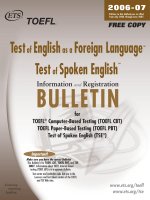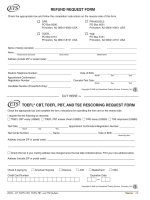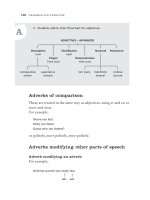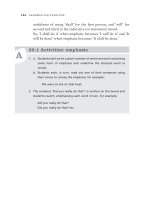Tài liệu Grammar for TOEFL test ppt
Bạn đang xem bản rút gọn của tài liệu. Xem và tải ngay bản đầy đủ của tài liệu tại đây (143.98 KB, 17 trang )
Objective 2: Check verb, agreement, tense, and form
Verbs: Key Concept
Verbs are the most complex part of speech in English. They can take many
different forms and function in many different ways. Verbs indicate the person and
number of the subject and the tense and voice (active and passive) of the action.
Every sentence has at least one clause and every clause has at least one verb.
Understanding verbs, therefore, is crucial to success on the TOEFL
®
.
Rules for subject-Verb agreement: Singular subjects
1. When the following words are used as Subjects, they are always singular.
Some of the words are Plural meaning, but they always require singular
verbs.
Everyone Someone Anyone No one Each
Everybody Somebody Anybody Nobody Either
Everything Something Anything Nothing Neither
Everyone is here.
S V
Neither of these book is very new.
2. When each or every comes before singular subjects joined by and, a singular
verb is required.
Every man and woman is eligible to vote
S S V
Each student and teacher has a locker.
S S V
3. Introductory it is singular and always followed by a singuler verb.
1
It was the dogs which awakened me
S V
It is his grades that worry him.
4. Words that come between a subject and its verb do not change the number of
the subject. Prepositional pharse often have this position.
The man
S
Everyone except him has a book.
S V
The teacher along with her student is viewing a film.
S V
One of the most enjoyable parties was given by Helen.
S V
5. There, here, and where are never subjects (except in a sentence like this one).
When a sentence begins with one of these words, the subject comes after the
verb.
There are no dogs in this neighborhood.
V S
Here are the result of the experiments.
V S
together with
his ten children is leaving soon.
V
in addition to
along with
as well as
2
Rules for subject-verb agreement: Plural subjects
1. Subjects joined by and or both…..and….. take a plural verb.
A red Honda and a blue Ford are packed outside.
S S V
Both tigers and elephants are becoming extinct.
S S V
2. Some nouns are always plural in form and always take plural verbs.
Clothes: trousers, pants, jeans, sunglasses
Tools: scissors, pliers, tweezers
Abstract: riches, thanks, means
However, some of them are followed by a singular verb when used in
expressions such as a pair of…., a word of….
His pants are still at the cleaners. But: That pair of pants is dirty.
S V S V
Your thanks are enough for me. But: A word of thanks is enough.
S V S V
3. Several, many, both, few are plural words and always take a plural verb.
Both are going to attend the University of Texas.
S V
Only a few have passed the exam.
S V
Rules for subject-verb agreement: Alternatives
1. When subjects are joined by the following structures, the verb must agree
with the closer subject.
Neither the students nor the teacher is allowed to smoke.
S S V
Either the teacher or the students have your books.
3
S S V
Not only the nurse but also the doctor is coming soon.
S S V
2. Many words may be singular or plural depending on what they refer to:
none, all, some, any, majority, most, half. When these words are followed by
a prepositional phrase, the number of the object of the preposition will
determine whether the words are singular or plural.
All of the book has been destroyed.
S V
All of the books have been thrown away.
S V
All of the money is in the bank.
S V
3. The expression a number of is plural, and the expression the number of is
singular
A number of students were missing from class.
S V
The number of Mexican students in class is small.
S V
Rules for subject- agreement: unusual singular
1. Expression stating one amount of time, money, weight, volume… is plural in
form but take a singular verb.
Two weeks is enough time for a nice vacation.
S V
Five hundred dollars is required as a down payment.
S V
Ten extra pounds is a lot to lose in a week.
S V
Twenty gallons of gasoline costs a lot of money.
4
S V
2. Some words are always plural in form but singular meaning. These words
require singular verbs.
Academic subjects: mathematics, physics, economics, statistics, civics…
Diseases: measles, mumps, herpes…
Abstract nouns: news, ethics, politics….
Mathematics is a difficult subject.
S V
The news was very good.
S V
3. Title of books and movies, even if plural in form, take singular verbs.
The New York Times is a good newspaper.
S V
Star Wars was a good movie.
S V
Rules for subjects-verb agreement: Singular and Plural
subjects with the same form.
1. Collective nouns are usually singular, but may be plural if the members are
functioning independently. Watch the pronouns for clues to the singular or
plural nature of the subject. Some of these words are class, team, police,
committee, audience, family, faculty,etc.
That class has its final test on Friday.
S V
The class are working on their individual projects today.
S V
2. Some nouns use the same form for both singular and plural meanings. The
pronouns and modifiers with these words will indicate whether they are
singular or plural in meaning.
Always with s: species, series, etc.
5
That species is rare. Those species are common.
S V S V
Never with s: sheep, deer, etc
That deer is young. Those deer are old.
S V S V
Rules for subject-verb agreement: Nationality and foreign
words.
Nouns for nationality that end with –ese, -ch, -sh may be singular or plural
depending on their meaning. Some of these words are Chinese, French, English, etc.
When the word refers to a language, it takes singular verb. When the word refers to
the people of the country, it takes a plural verb and is preceded by the article the.
French is a romance language. The French are romantic.
S V S
English is spoken in the USA. The English love tea.
S V S V
6









